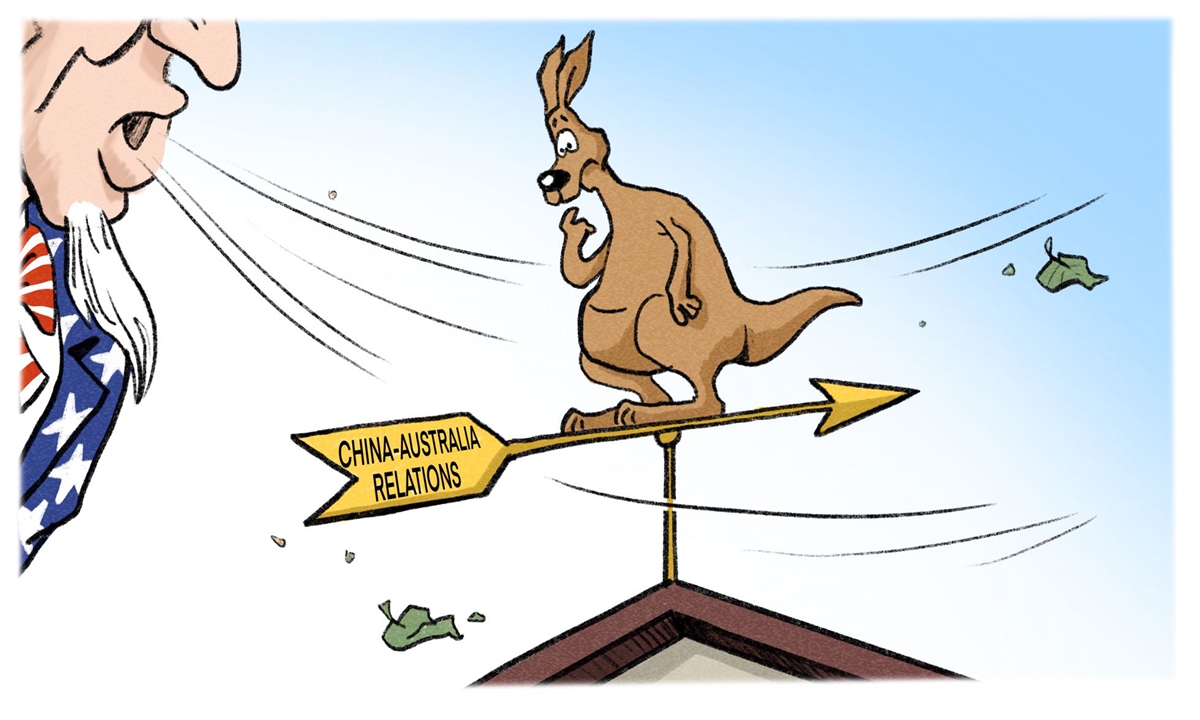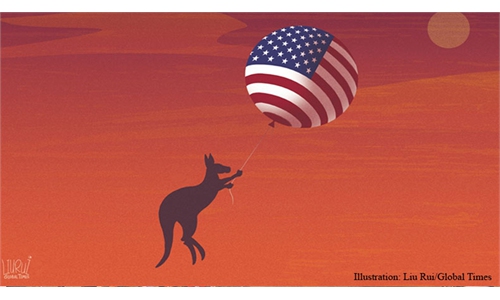US plays on ‘alliance’ loyalty, Australian fear, racism to manipulate Canberra: former diplomat

China-Australia relations. Illustration: Liu Rui/Global Times
Editor's Note:Australia does not formulate a foreign policy independent of the United States, and because of the immaturity of the LNP and its lack of vision, Canberra has failed to balance its relationship between the US and China, former Australian diplomatic and political commentator Bruce Haigh (Haigh) has told the Global Times. He believes the relationship with China will become better when proper and professional diplomacy is employed. As the 2022 Australian federal election kicks off on Saturday, how is it expected to affect the Australia-China bilateral relationship? What has gone wrong with Australia's China policy and can the new government rectify it?Haigh shared his views with Global Times (GT) reporter Yu Jincui over these issues.
GT: In your opinion, why has the China-Australia relations deteriorated from a normal and healthy track in recent years?
Haigh: China-Australia relations derailed in recent years as US attitudes hardened toward China. The US grew more hostile as they increasingly came to see China as a major competitor. They have attempted to recruit many countries to contain China with Australia being of the more successful recruits. They played on "alliance" loyalty, Australian fear of the US not honoring, mostly unspoken, guarantees of Australian security, Australian racism and fear of the large Asian populations to its north, particularly China. This fear is a white colonial hangover dating back to the 1880's. As US attitudes hardened, so did China's with all sides becoming less tolerant. This has not enabled easy diplomacy.
GT: The past 15 years witnessed five Australian prime ministers, including Kevin Rudd, Julia Gillard, Tony Abbott, Malcolm Turnbull and Scott Morrison. What was the best and the worst period (under which prime minister) of bilateral relations over the past 15 years?And how do different Australian ruling parties influence the bilateral relationship?
Haigh: The LNP has always been suspicious of Asia and China in particular. This is because they hold racist attitudes and a world view fashioned in the Cold War. They cannot see past the nomenclature of "communist." It was a factor leading them into the war in Vietnam. The LNP has a very narrow view of the world. The worst period in the bilateral relationship over the past 15 years is now, the best period would probably be under Gillard which carried for a time into the Abbott Prime Ministership.

Bruce Haigh
GT: Australian scholar James Laurenceson said in a previous interview with the Global Times that since 2016, the national security establishment has come to dominate Canberra's thinking about China. As a member of Five Eyes alliance, is Australia's foreign policy losing its autonomy by closely following the US?Haigh: Yes, the Department of Foreign Affairs and Trade has been marginalized by ASPI and the Intelligence Agencies. This was evident during the Solomons "crisis" where intelligence chiefs were dispatched on what should have been a diplomatic mission. All appointments to Agencies are vetted by, if not directly influenced by, the ruling LNP. The ASPI is partly funded by US arms manufacturers, and the US government through its embassy. Australia follows and is influenced by US government, its agencies and businesses.
GT: Many countries are facing a situation whereby they rely on China for economics and the US for security, but they are able to maintain a balance. Why can't Australia do this?
Haigh: Indeed why can't Australia balance its relationship with China and the US? There are two reasons. One is that Australia does not formulate foreign policy independent of the US, the other is the immaturity of the LNP and lack of vision.
GT: Reports show that Washington has become the biggest beneficiary of the China-Australian dispute with US competitors filling the gap Australian businesses lost in the Chinese market. How do you view the situation?
Haigh: It should be looked at in the light of the LNP's blind trust in the US and its naivety.
GT: Both major party candidates are playing the "China card" ahead of the election. How will this affect the election result? Is "China policy" an important element that will affect the voters?
Haigh: The LNP has tried to play the 'China card' but it blew back in their face over the Solomons where incompetent diplomacy became the narrative. Other election issues have now pushed discussion of China to one side.
GT: As you forecast, when and under what conditions will China-Australia relations return to a normal and healthy track?
Haigh: The relationship with China will become better when proper and professional diplomacy is deployed. This might first entail opening a dialogue through 'informal' channels and moving it into closed formal discussions.
GT: What are the hidden dangers that the existence of AUKUS will bring to China-Australia bilateral relationship? Are you optimistic about the future of China-Australia relations? In which areas and fields, will Australia still stick to the wrong path in developing ties with China?
Haigh: Consideration of AUKUS by Australia has been rushed, it needs widespread and deep examination. At the moment it is an arrangement to use Australian territory and US resources to confront China. There is no advantage for Australia in fact there are distinct disadvantages. As currently proposed AUKUS will make Australia's relations with China and the region more difficult. It is an unnecessary confrontational arrangement which unfortunately China is likely to feel constrained to match. It will force regional countries to "take sides".
I feel confident about the future Australia-China relationship if America and China can negotiate their differences. If America can stop prodding China and Australia pushes back on the US and seeks to formulate an independent foreign policy. For its part China will need to be a little less defensive and slightly less concerned with other states displaying deference to China's undoubted achievements and power. A powerful state can lead by example, it can afford to be magnanimous and understand the shortcomings of other states when they do not threaten the security and basic interests of China.



